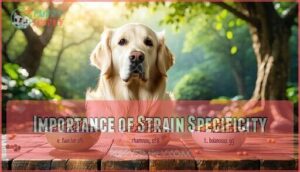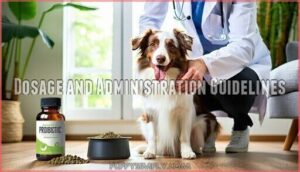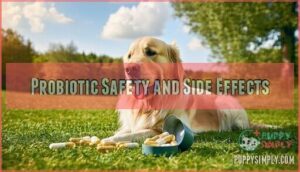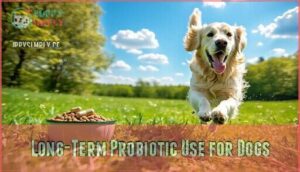This site is supported by our readers. We may earn a commission, at no cost to you, if you purchase through links.

These beneficial bacteria supplements help restore your pup’s gut balance by crowding out harmful pathogens and supporting healthy digestion.
Look for veterinarian-formulated options containing dog-specific strains like Lactobacillus acidophilus and Bifidobacterium animalis – they’re designed to survive your dog’s unique digestive environment, unlike human probiotics.
Most dogs see improvement within 24-48 hours, whether their tummy troubles stem from stress, dietary changes, or antibiotic treatments. The key lies in choosing the right strains and proper dosing for your furry friend’s specific needs, which is crucial for restoring their gut balance and ensuring healthy digestion.
Table Of Contents
- Key Takeaways
- Probiotics for Dog Diarrhea
- Causes of Diarrhea in Dogs
- Top 3 Probiotics for Dogs
- Choosing The Right Probiotic
- Probiotic Safety and Side Effects
- Managing Diarrhea With Probiotics
- Long-Term Probiotic Use for Dogs
- Frequently Asked Questions (FAQs)
- Are probiotics good for dogs with diarrhea?
- What is the best remedy for dogs with diarrhea?
- How quickly do probiotics work in dogs with diarrhea?
- How do I tell if my dog needs a probiotic?
- Can probiotics replace antibiotics for bacterial diarrhea?
- How long before probiotics show diarrhea improvement?
- Are human probiotics safe for dogs temporarily?
- Whats the ideal CFU count for dogs?
- Do probiotics work for food poisoning diarrhea?
- Conclusion
Key Takeaways
- Choose veterinarian-formulated probiotics with dog-specific strains like Lactobacillus acidophilus and Bifidobacterium animalis – they are designed to survive your dog’s digestive system, unlike human probiotics.
- Expect improvement within 24-48 hours for most cases of diarrhea caused by stress, dietary changes, or antibiotic treatments when you use the right strains and proper dosing.
- Look for multi-strain formulas with 1-10 billion CFUs daily – clinical evidence shows these outperform single-strain options, and you should start with lower doses, then gradually increase.
- Monitor your dog’s progress closely and combine probiotics with bland diets or other treatments for faster recovery; consult your vet if symptoms persist beyond 48 hours or worsen.
Probiotics for Dog Diarrhea
When your dog develops diarrhea, probiotics can restore gut balance and speed recovery by replenishing beneficial bacteria.
These live microorganisms work by competing with harmful pathogens and producing healing compounds that reduce inflammation in your dog’s digestive tract, which helps to restore the gut balance.
**Probiotics create a protective army of good bacteria that fights harmful pathogens and heals your dog’s inflamed gut naturally.
Benefits of Probiotics for Dogs
Probiotics pack a powerful punch for your dog’s digestive wellness, offering multiple benefits that go beyond simple diarrhea relief.
These beneficial bacteria restore gut health by balancing intestinal microbiota and supporting proper nutrient absorption. Canine probiotics provide an immune boost while maintaining digestive balance, helping your furry friend bounce back faster from stomach upsets and preventing future episodes.
Regular website maintenance like checking for technical error issues is also essential for a smooth user experience, ensuring your dog receives the best care through reliable online resources that discuss the benefits of probiotics and how they support overall digestive wellness.
How Probiotics Work for Diarrhea
When your dog’s digestive system encounters trouble, beneficial bacteria spring into action to restore gut balance.
These probiotic strains compete with harmful microorganisms, reducing inflammation while producing short-chain fatty acids that promote gut healing.
By reestablishing microbiome health, canine probiotics create an environment where healthy bacteria thrive, providing effective diarrhea relief through natural biological processes.
Common Probiotic Strains for Dogs
Understanding probiotic strains makes choosing the right dog gut health supplements easier.
Lactobacillus and Bifidobacterium lead the pack for canine probiotics benefits, while Enterococcus faecium excels at restoring gut balance.
Each strain offers unique microbiome support – think of them as specialized workers in your dog’s digestive factory.
Bacillus coagulans and Saccharomyces boulardii particularly shine for probiotics for dogs with diarrhea, targeting inflammation while promoting canine health.
For maximum results, this is vital when selecting a supplement for your dog: view best probiotics to achieve the best outcome.
Causes of Diarrhea in Dogs
Understanding why your dog develops diarrhea helps you choose the right treatment approach and prevent future episodes.
Common triggers include sudden dietary changes, bacterial or viral infections, and stress-related factors that disrupt your pet’s digestive balance.
Dietary Changes and Diarrhea
When you change your dog’s food too quickly, you’re asking for trouble.
Your pup’s digestive system needs time to adjust — rushing food changes disrupts gut balance completely.
Your pup’s digestive system needs time to adjust, and sudden switches can throw gut balance completely off track.
Food sensitivity issues often trigger diarrhea when new proteins or ingredients overwhelm digestive enzymes and disrupt nutrient absorption.
Common dietary triggers include:
- High-fat treats that exceed your dog’s digestive capacity
- Rapid food switches without gradual mixing periods
- Table scraps containing spices or unfamiliar ingredients
- Low-quality kibble lacking adequate dietary fiber
- Expired food with compromised nutritional integrity.
Smart feeding practices support dog gut health and prevent unnecessary digestive upset requiring diarrhea treatment dogs later.
Infections and Diarrhea
When pathogens invade your dog’s system, they can quickly turn your pet’s digestive tract into a battleground.
Viral infections, bacterial diarrhea, and parasites disrupt normal gut function, while fungal causes create additional complications requiring targeted diarrhea treatment dogs approaches.
| Infection Type | Common Examples |
|---|---|
| Viral Infections | Parvovirus, Coronavirus |
| Bacterial Diarrhea | Salmonella, E. coli |
| Parasites | Giardia, Roundworms |
| Fungal Causes | Candida overgrowth |
Probiotics for dogs with diarrhea support gut healing by restoring beneficial bacteria populations.
These probiotic supplements dogs help rebuild compromised dog gut health, providing essential dog diarrhea relief through parasite control and microbiome restoration.
Understanding dog diarrhea causes is essential for effective treatment and prevention of the condition.
Stress and Diarrhea
Canine anxiety acts as a silent saboteur, disrupting your dog’s digestive health when you least expect it.
Moving homes, loud noises, or separation can trigger stress-related diarrhea through complex gut-brain connections.
Key stress response factors affecting digestive health include:
- Cortisol elevation – disrupts gut balance and healthy bacteria
- Nervous system activation – accelerates intestinal transit time
- Immune suppression – increases susceptibility to diarrhea triggers
Probiotics for dogs with diarrhea provide targeted relief by restoring beneficial microbes depleted during stressful episodes, offering effective dog diarrhea relief through probiotic supplements dogs can easily tolerate.
Top 3 Probiotics for Dogs
You’ll find three vet-approved probiotics that consistently help dogs overcome diarrhea while restoring healthy gut bacteria balance.
These carefully selected options offer proven strain combinations, proper dosing, and excellent palatability to guarantee your dog gets the digestive support they need, with excellent palatability.
1. Probiotics for Dog Digestive Health
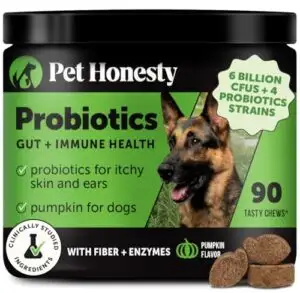
Among over-the-counter options, these vet-recommended chews stand out for their thorough approach to digestive health.
You’ll find probiotics, prebiotics, enzymes, and fiber working together like a well-orchestrated team.
Made with sweet potato and pumpkin, they’re free from artificial additives that could upset sensitive stomachs.
Clinical data shows 85% of users saw improvement within three months, making this a reliable choice for managing your dog’s digestive issues naturally and effectively.
Best For: Dog owners seeking a comprehensive, science-backed solution for digestive issues, especially those with dogs experiencing diarrhea, gas, or sensitive stomachs.
- Contains multiple active ingredients (probiotics, prebiotics, enzymes, fiber) that work synergistically for complete digestive support
- High success rate with 85% of users reporting improvement within three months according to clinical data
- Made with natural ingredients like sweet potato and pumpkin without artificial additives, making it suitable for sensitive stomachs
- Some dogs refuse to eat the chews due to taste preferences, making administration challenging
- Mixed results reported by users, with some seeing no improvement in itching or digestive symptoms
- May require dosage adjustments for smaller dogs and works best when combined with dietary changes
2. Probiotics for Dogs Digestive Health
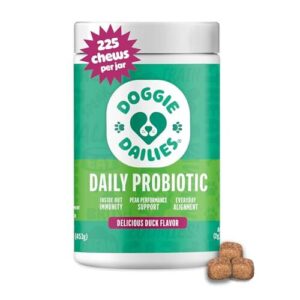
This second runner-up delivers impressive results with its five-strain formula containing Lactobacillus Acidophilus, Plantarum, Brevis, Fermentum, and Lactis.
You’ll appreciate the grain-free duck and pumpkin flavors that make administration effortless since most dogs gobble them up like treats.
Clinical evidence shows multi-strain probiotics outperform single-strain options for digestive health.
These soft chews support your dog’s immune system while replacing beneficial bacteria lost during antibiotic treatments, keeping their gut flora balanced and promoting overall wellness.
Best For: Dog owners seeking a multi-strain probiotic to support digestive health, immune function, and gut flora balance, especially after antibiotic treatments.
- Five-strain formula with clinically proven Lactobacillus strains offers superior digestive support compared to single-strain alternatives
- Grain-free duck and pumpkin flavors make administration simple since dogs enjoy them as treats
- Supports both immune system health and beneficial bacteria replacement during antibiotic recovery
- Contains corn germ meal and soybean meal that may trigger allergies in sensitive dogs
- Non-returnable policy poses risk for dogs with specific food sensitivities or allergies
- Price increases noted by users may make long-term use costly for some pet owners
3. Dog Digestive Health Supplement Powder
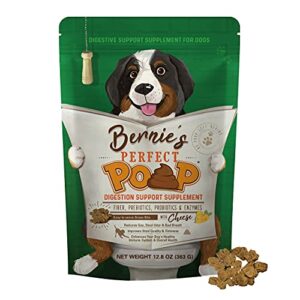
Premium supplement powders combine probiotics, prebiotics, and digestive enzymes into one all-encompassing formula that targets multiple digestive issues simultaneously.
You’ll find these multi-action products particularly effective for dogs experiencing chronic diarrhea or constipation since they address root causes rather than just symptoms.
Popular formulations include Miscanthus grass fiber, pumpkin powder, and proven probiotic strains like Bacillus subtilis that work together to restore normal bowel function within days.
Best For: Dog owners dealing with chronic digestive issues like diarrhea, constipation, or irregular bowel movements who want a comprehensive solution that combines multiple gut health benefits in one product.
- Premium pricing may be higher than basic single-ingredient supplements, though it offsets costs by combining multiple products
- Some dogs may be initially picky about the flavor and require gradual introduction or mixing with food for acceptance
- Results can vary depending on individual dog’s specific digestive needs, and it’s not a universal cure-all for every digestive issue
- Multi-action formula combines probiotics, prebiotics, and digestive enzymes to address root causes of digestive problems rather than just treating symptoms
- Fast results with many dogs showing improved stool consistency and reduced digestive issues within days of starting supplementation
- Cost-effective approach that replaces multiple individual supplements while providing natural, grain-free ingredients made in the USA
Choosing The Right Probiotic
Selecting the right probiotic for your dog’s diarrhea requires careful attention to strain diversity, colony-forming unit (CFU) counts, and veterinary-grade formulations.
You’ll want to prioritize products with proven clinical data and specific strains like Enterococcus faecium or Lactobacillus acidophilus that target digestive issues effectively.
Factors to Consider When Selecting Probiotics
When selecting probiotics for dogs with diarrhea, you’ll want to focus on three key factors that directly impact effectiveness:
- Product Quality – Look for third-party tested supplements with guaranteed viable colony counts, as less than 50% of over-the-counter canine probiotics contain their labeled potency levels at purchase.
- Strain Specificity – Choose products featuring proven probiotic strains like Enterococcus faecium and Lactobacillus acidophilus, which specifically target canine diarrhea symptoms.
- Dosage Guidelines – Follow veterinary recommendations for 1-10 billion CFUs daily to guarantee therapeutic benefits without overwhelming your dog’s digestive system.
Understanding yeast infection causes is also vital in managing canine health.
Importance of Strain Specificity
When choosing probiotics for dogs with diarrhea, strain specificity determines success.
Research shows Enterococcus faecium SF68 reduces diarrhea episodes by 70%, while undefined blends show minimal results.
Strain efficacy varies dramatically—Lactobacillus rhamnosus GG shortens symptoms by 1.2 days, demonstrating how probiotic potency depends on precise identification rather than generic formulations.
Understanding probiotic strain is essential for effective treatment.
| Strain | Primary Benefit | Success Rate |
|---|---|---|
| E. faecium SF68 | Reduces episodes | 70% improvement |
| L. rhamnosus GG | Shortens duration | 1.2 days faster |
| S. boulardii | Neutralizes toxins | 85% survival rate |
Dosage and Administration Guidelines
Your dog’s probiotic dosage depends on their weight and specific needs.
Most veterinarians recommend 1-10 billion CFUs daily, but you’ll want to start small and gradually increase.
Administer probiotics with food unless your vet suggests otherwise.
Timing matters—consistency helps establish healthy gut bacteria, and follow your veterinarian’s feeding guidelines for best results.
Understanding the correct probiotic dosage levels is vital for your dog’s health.
Probiotic Safety and Side Effects
While probiotics are generally safe for dogs, you’ll want to know about potential side effects before starting your pup on supplements.
Most dogs tolerate probiotics well, but some may experience temporary digestive upset, gas, or mild diarrhea as their gut adjusts to the new bacteria.
Potential Risks and Side Effects
While probiotics are generally safe, you should watch for potential side effects.
Up to 15% of dogs experience mild bloating or gas when starting probiotics.
Some develop temporary gut discomfort, loose stools, or vomiting within the first 48 hours.
Probiotic overdose can worsen diarrhea, especially with excessive dosages or prolonged use beyond recommendations.
Allergic Reactions and Interactions
While probiotics are generally safe, some dogs may experience allergic reactions or sensitivity.
Watch for symptoms like excessive itching, swelling, or digestive upset after starting supplementation.
Certain probiotics can interact with medications, particularly antibiotics or immunosuppressants.
Always inform your veterinarian about any supplements before combining treatments.
Allergy tests aren’t typically needed unless your dog shows unusual immune responses to multiple probiotic strains.
Understanding the role of gut health benefits is essential in managing canine allergies and ensuring the effectiveness of probiotic supplements.
Precautions for Puppies and Senior Dogs
Often, puppies under eight weeks shouldn’t receive probiotics without veterinary guidance, as their digestive systems remain delicate.
Senior dogs may need adjusted dosages due to slower metabolism and potential medication interactions.
Puppy care requires age-specific formulations, while senior health considerations include monitoring for digestive sensitivity.
Always consult your veterinarian before starting probiotic dosage for dog diarrhea.
Managing Diarrhea With Probiotics
Successfully managing your dog’s diarrhea with probiotics requires careful monitoring and strategic adjustments to guarantee the best results.
You’ll need to track your pet’s progress, potentially combine treatments, and know when professional veterinary guidance becomes essential for your dog’s recovery.
Monitoring Progress and Adjusting Dosage
Keeping tabs on your dog’s improvement helps you fine-tune their probiotics for dogs with diarrhea treatment.
Track these key indicators for effective dog diarrhea management:
- Stool consistency changes – Note firmness improvements within 3-7 days of starting treatment
- Frequency reduction – Monitor bathroom trips decreasing as canine probiotics effectiveness kicks in
- Appetite and energy levels – Watch for returned enthusiasm as gut health stabilizes
Adjust dog probiotics dosage based on progress tracking results.
If improvement stalls after two weeks, consult your vet about adjustment strategies for ideal treatment outcomes.
Combining Probiotics With Other Treatments
Once you’ve monitored your dog’s response, you’ll likely want to amplify probiotic benefits through strategic Treatment Synergy.
Combining probiotics with other treatments creates powerful gut rehabilitation pathways that work faster than single approaches. Smart Supplement Combinations can reduce diarrhea episodes by up to 30% when paired correctly with traditional therapies.
| Treatment Combination | Expected Benefit |
|---|---|
| Probiotics + Antibiotics | 30% faster recovery |
| Probiotics + Bland Diet | Improved stool consistency |
| Probiotics + Electrolytes | Enhanced rehydration |
| Probiotics + Anti-parasitic drugs | Better medication tolerance |
Dietary Therapy works hand-in-hand with probiotics for dogs with diarrhea. Pairing your chosen dog diarrhea treatment with highly digestible foods creates an ideal healing environment.
The key lies in understanding Probiotic Interactions—some combinations boost effectiveness while others may interfere with bacterial colonization. Understanding probiotic products is essential for making informed decisions about your dog’s health.
When to Seek Veterinary Advice
Contact your veterinarian if diarrhea persists beyond 24-48 hours, worsens despite probiotic treatment, or includes blood, mucus, or severe dehydration symptoms.
Emergency care becomes necessary when dogs show lethargy, vomiting, or refuse water.
Health monitoring during probiotic side effects helps determine whether digestive issues stem from supplements or underlying conditions requiring immediate veterinary advice.
Long-Term Probiotic Use for Dogs
Once you’ve successfully treated your dog’s acute diarrhea with probiotics, you shouldn’t stop there.
Long-term probiotic supplementation offers lasting benefits that go beyond managing digestive upsets, supporting your pet’s overall health and potentially preventing future episodes of diarrhea.
Maintaining Gut Health and Preventing Diarrhea
Daily probiotic supplements create a protective barrier in your dog’s gut, maintaining microbiome health that prevents digestive disasters before they strike.
Consistent canine nutrition with digestive enzymes supports gut balance, reducing diarrhea recurrence by 40%.
Think of probiotics as your dog’s personal bodyguards—they’re always on duty, keeping harmful bacteria from causing chaos in the digestive system, which is crucial for overall gut balance.
Boosting Immune Function and Overall Health
Beyond the gut, probiotics work wonders throughout your dog’s body.
These beneficial bacteria strengthen your dog’s immune system by supporting microbiome balance, which helps fight off infections and diseases.
Regular probiotic use enhances canine wellness by improving nutrient absorption and reducing inflammation.
Your furry friend’s overall health gets a significant immune boost, making probiotics for dogs with diarrhea a smart long-term investment in their healthiness.
Tips for Continuous Probiotic Use and Monitoring
Establish consistent probiotic dosage routines for ideal gut health maintenance.
Track your dog’s response to different probiotic strains through weekly assessments.
Rotate dog nutrition gradually when switching probiotic supplements for dogs to prevent digestive upset.
Store probiotics properly to maintain probiotic safety and potency.
Regular veterinary check-ups guarantee effective dog diarrhea management with probiotics continues working smoothly.
Frequently Asked Questions (FAQs)
Are probiotics good for dogs with diarrhea?
Yes, probiotics can effectively help dogs with diarrhea by restoring gut bacteria balance, reducing inflammation, and promoting healing.
They’re generally safe but consult your vet first for proper strain selection and dosage recommendations.
What is the best remedy for dogs with diarrhea?
Combine a bland diet like boiled chicken and rice with dog-specific probiotics containing multiple strains.
Add canned pumpkin for fiber, make certain fresh water access.
Consult your vet if symptoms persist beyond 48 hours, using probiotics as part of the treatment may help alleviate issues.
How quickly do probiotics work in dogs with diarrhea?
Most veterinary gastroenterologists report that probiotics typically show initial improvements within 3-5 days for mild diarrhea, though full gut microbiome restoration takes 1-2 weeks of consistent administration.
How do I tell if my dog needs a probiotic?
Look for loose stools, digestive upset, stress-related stomach issues, or recent antibiotic use. Dogs recovering from illness or eating dietary changes often benefit from probiotics for gut balance restoration.
Can probiotics replace antibiotics for bacterial diarrhea?
No, probiotics can’t replace antibiotics for bacterial diarrhea. They’re helpful support therapy, but bacterial infections need proper antibiotic treatment. Your vet may recommend using probiotics alongside antibiotics for better recovery.
How long before probiotics show diarrhea improvement?
Like a garden slowly awakening from winter’s grip, your dog’s digestive system needs time to bloom with beneficial bacteria.
You’ll typically see improvement within 3-7 days, though severe cases may require 1-2 weeks for full restoration.
Are human probiotics safe for dogs temporarily?
No, you shouldn’t give human probiotics to your dog temporarily.
Human formulations aren’t designed for dogs’ digestive systems and may contain harmful ingredients.
Always use dog-specific probiotics for safety and effectiveness.
Whats the ideal CFU count for dogs?
Finding the right balance is like Goldilocks and the three bears – you want it just right.
Veterinarians typically recommend 1 to 10 billion CFUs daily for dogs, with dosage adjusted based on your dog’s size and diarrhea severity.
Do probiotics work for food poisoning diarrhea?
Yes, probiotics can help with food poisoning diarrhea in dogs. They restore beneficial gut bacteria disrupted by harmful pathogens, reduce inflammation, and support faster recovery when used alongside veterinary treatment.
Conclusion
Like a lighthouse guiding ships through stormy seas, the right probiotic for dogs with diarrhea serves as your pet’s beacon back to digestive wellness.
You’ve learned that veterinarian-formulated options with specific strains work faster than generic supplements.
Remember, most dogs show improvement within 24-48 hours when you choose quality products containing Lactobacillus acidophilus and Bifidobacterium animalis.
Trust your instincts, monitor your pup’s progress, and don’t hesitate to consult your veterinarian if symptoms persist beyond expectations.
- https://thepetlabco.onelink.me/ETMR/y43xj9ou
- https://www.frontiersin.org/journals/veterinary-science/articles/10.3389/fvets.2019.00277/full
- https://www.ncbi.nlm.nih.gov/pmc/articles/PMC5354029/
- https://www.cambridge.org/core/journals/journal-of-applied-animal-nutrition/article/abs/effect-of-calsporin-bacillus-subtilis-c3102-addition-to-the-diet-on-faecal-quality-and-nutrient-digestibility-in-healthy-adult-dogs/1D0BEF5B11F5A47A831F8DFD90C08D99
- https://pmc.ncbi.nlm.nih.gov/articles/PMC11205510/



